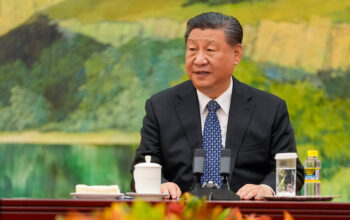
Presidents in France are elected directly by the people for five-year terms, in a two-round system. This year, the first round was held on April 10, and the second round is being held on Sunday.
A candidate who gets an absolute majority of votes in the first round is elected outright, an unlikely outcome that has never come to pass since the French started choosing presidents by direct popular vote in 1965.
Instead, a runoff is usually held between the top two candidates. This year, it is a repeat of the most recent contest, in 2017, when Emmanuel Macron defeated Marine Le Pen.
The two-round system is simple but has complex implications for voters. They have to choose between a dozen or more candidates in the first round, and then, if their preferred candidate doesn’t make the runoff, between two candidates they might not like.
One way to try to avoid that predicament is through “useful” voting. Instead of going with their top choice in the first round, voters might opt to go with their second or third if they believe that candidate has a better chance of getting into the runoff.
That mechanism helped fuel a surge by Jean-Luc Mélenchon, a fiery politician who came in a strong third place two weeks ago, partly by attracting voters who thought he was the left-wing candidate best positioned to reach the runoff.
One common saying is that people vote with their hearts in the first round and with their heads in the runoff; another is that in the first round, voters choose, while in the second, they eliminate.
A prime example is the so-called Republican front, when voters cast differences aside to counter the far right. In 2017, many voters who disliked Mr. Macron and hadn’t voted for him in the first round picked him in the runoff, propelling him to a sweeping victory over Ms. Le Pen.
But this year, nearly a third of the ballots went to the extreme right in the first round, and many left-wing voters felt betrayed by Mr. Macron’s rightward drift, so he may have a harder time repeating that feat.
Ms. Le Pen and Mr. Macron have actively courted the 21.95 percent of voters who picked Mr. Mélenchon in the first round. But polls show that those voters are very split and uncertain about their runoff choice, making it hard to predict which candidate will benefit most.



